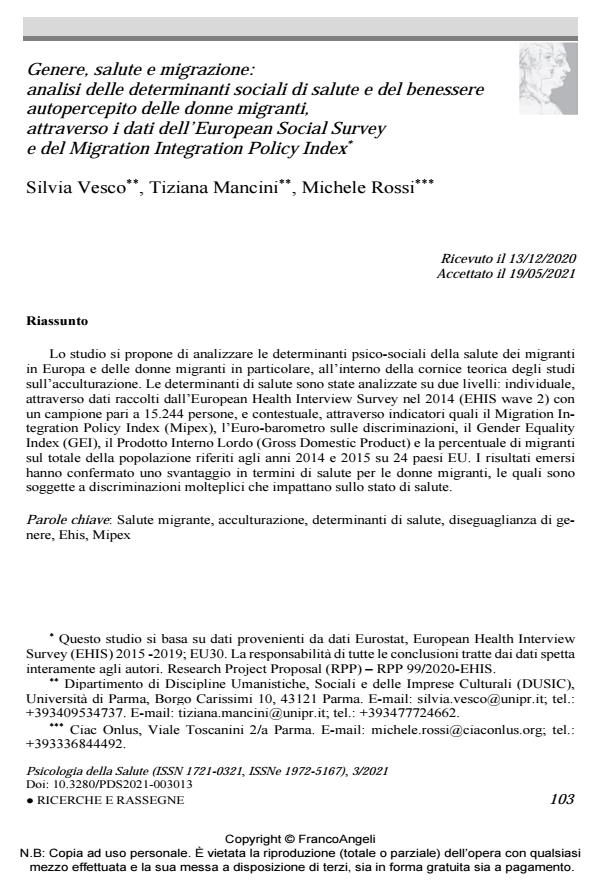Gender, health and migration: analysis of social determinants of health and self-perceived well-being of migrant women, through data from the European social survey and migration integration policy index
Journal title PSICOLOGIA DELLA SALUTE
Author/s Silvia Vesco, Tiziana Mancini, Michele Rossi
Publishing Year 2021 Issue 2021/3
Language Italian Pages 22 P. 103-124 File size 323 KB
DOI 10.3280/PDS2021-003013
DOI is like a bar code for intellectual property: to have more infomation
click here
Below, you can see the article first page
If you want to buy this article in PDF format, you can do it, following the instructions to buy download credits

FrancoAngeli is member of Publishers International Linking Association, Inc (PILA), a not-for-profit association which run the CrossRef service enabling links to and from online scholarly content.
The study aims to analyse the psycho - social determinants of the health of migrants in Europe and migrant women in particular, within the theoretical framework of studies on accul-turation. Health determinants have been analysed on two levels: individual, through data col-lected of 15.244 participants by the European Health Interview Survey in 2014 (EHIS wave 2), and contextual, through indicators such as the Migration Integration Policy Index (Mipex), the Euro-barometer on discrimination, the Gender Equality Index (EEIG), the Gross Domestic Product (Gross Domestic Product) and the percentage of migrants in the total population for the years 2014 and 2015 for 24 EU countries. The findings have confirmed a health disad-vantage for migrant women, who are subject to multiple discrimination affecting their health.
Keywords: Migrant health, acculturation, health determinants, gender inequality, Ehis, Mipex
-
Unveiling double standards: gendered racism and health disparities among African-Black and European-White migrant women in Italy /
Desvelando dobles estándares: racismo de género y desigualdades de salud entre las mujeres migrantes en Italia
Tiziana Mancini, Michele Rossi, Silvia Vesco, in International Journal of Social Psychology: Revista de Psicología Social /2025 pp.651
DOI: 10.1177/02134748251370193
Silvia Vesco, Tiziana Mancini, Michele Rossi, Genere, salute e migrazione: analisi delle determinanti sociali di salute e del benessere autopercepito delle donne migranti, attraverso i dati dell’European Social Survey e del Migration Integration Policy Index in "PSICOLOGIA DELLA SALUTE" 3/2021, pp 103-124, DOI: 10.3280/PDS2021-003013